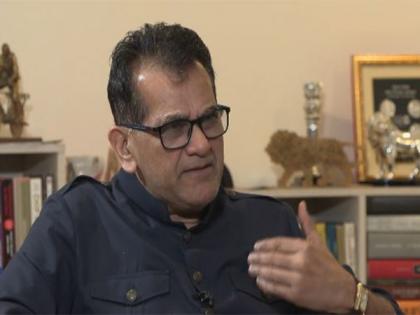"India should not compromise on its energy security or strategic autonomy": Amitabh Kant on US Tariffs
By ANI | Updated: August 14, 2025 20:44 IST2025-08-14T20:35:33+5:302025-08-14T20:44:59+5:30
New Delhi [India], August 14 : Former Niti Aayog chief and G20 Sherpa Amitabh Kant on Thursday urged India ...

"India should not compromise on its energy security or strategic autonomy": Amitabh Kant on US Tariffs
New Delhi [India], August 14 : Former Niti Aayog chief and G20 Sherpa Amitabh Kant on Thursday urged India to maintain its strategic autonomy and energy security in the face of proposed US tariffs.
Kant said that India should prioritise its national interests and not compromise on its energy security, especially considering that India's oil imports from Russia are significantly lower than those of China or Turkey. The US has imposed a 50% tariff on Indian goods, citing India's continued purchase of Russian oil.
Speaking to ANI, Kant said, "I'm a believer that India should not compromise on its energy security or its strategic autonomy. We are here for a long-term game and we must win the long-term war. My belief is that we built up a relationship with the United States over two and a half decades, which was bipartisan. And this attempt to put a 50 per cent duty does not stand to logic because we import oil."
US President Donald Trump announced 25 per cent tariffs on Indian goods plus an unspecified penalty in July, even as there were hopes of an interim India-US trade deal that would have otherwise helped avoid elevated tariffs. A few days later, he imposed another 25 per cent tariff, taking the total to 50 per cent, over India's imports of Russian oil.
"If we do not import from Russia, then we are putting our citizens to great economic hardship. We will significantly impact our economy. Therefore, we should do what is in our national interest, and that is what the government is doing right now. My belief also is that this is a huge opportunity for India," he added.
He said that imposition of US tariffs is "totally arbitrary" and "not comprehensible." Kant advised patience in negotiations with the US, suggesting that India should engage in backroom negotiations and consider retaliatory tariffs if necessary.
"Brazil has not succumbed. China did not succumb. India need not succumb. I think we should hold on. We should also impose retaliatory tariffs. Not right now, because we still have 20 days to negotiate. Patience is a virtue in negotiations. We should do a lot of backroom negotiations," he added.
Calling the tariff proposal a huge opportunity for India, Kant said the situation should stimulate the country to undertake very vigorous reforms across the economy, including simplifying GST and personal taxes, reducing the statutory liquidity ratio to boost credit, building growth-oriented cities, fostering innovation, and using tourism to drive job creation.
He said, "I am a great believer in travel, tourism, and this is a huge opportunity for India. We've not done brand marketing of Incredible India for the last eighty-nine years; the Prime Minister has laid a lot of emphasis on tourism. It's a sector that will create jobs in a very big way, not merely the Government of India."
"But every state should become a driver of travel and tourism. Today, only Rajasthan, Kerala and Kashmir do that. Every state of India should drive tourism, and we should look at a very integrated marketing campaign of Incredible India, penetrating global economies across the world...India is buying 1800 planes. These planes should not be used to ferry Indians to the rest of the world. They should be utilised to attract tourists from around the world to India," he added.
Citing a Goldman Sachs study, Kant notes that the tariffs would have long-term adverse effects on the US economy, including inflation, slowdown of growth, and unemployment.
"It will have long-term implications for the United States in terms of inflation. It will have implications in terms of the slowdown of growth. It will have implications on unemployment creation and impact the United States economy in the long term," said Kant.
He emphasised that the Indian economy would face only a "very, very minor marginal impact," as key sectors like electronics, pharmaceuticals and services were not targeted.
Kant suggested exploring joint manufacturing ventures with Chinese firms in India, with Chinese companies holding minority stakes, to create jobs and reduce imports.
"Instead of importing from China, we should get Chinese to do joint ventures with Indian companies... That will create jobs in India," he said, suggesting a review of Press Note 3 to facilitate such collaboration.
Kant also addressed India's AI ambitions, noting that the country is building "sovereign frontier models" as part of its AI mission and pursuing other advanced technology programmes, including quantum computing, semiconductors and green hydrogen.
"We will continue to work with our economic autonomy, with our strategic interests and in the interest of economic growth in the long run," he said.
India is pursuing advanced technology programs, including quantum computing, semiconductors, and green hydrogen, while maintaining its economic autonomy and strategic interests.
Disclaimer: This post has been auto-published from an agency feed without any modifications to the text and has not been reviewed by an editor
Open in app